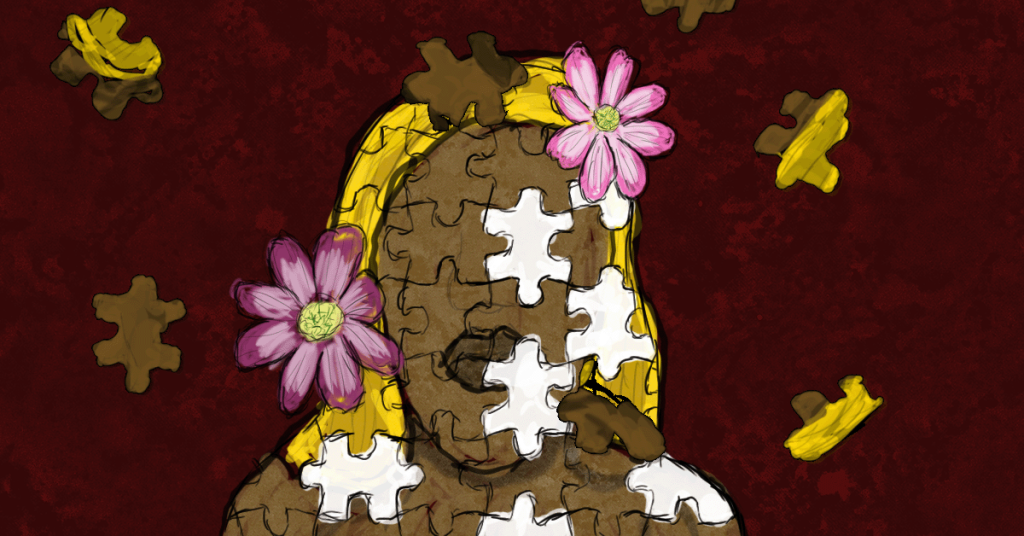She was bullied — again — for attending a women-only event as a trans woman
Trans in Nigeria: ‘I always know that anything can happen at any time,’
In April, Liber, a trans woman from Nigeria, attended a women-only event in Lagos. Online, her attendance was met with harassment and abuse, something Liber notes isn’t new to her. “I never let my guard down, not even in my room,” she says.

By Ernest Ifeanyi Nweke
At Hertitude, an all-female event organized for women by women, Liber, a 21-year-old trans student, competed in a beauty pageant and was met with violent transphobia online when pictures from the event were posted on Twitter (now known as X).
When asked about what that was like, she said of her trolls, “I remember going through the comments confused and wondering who they were saying all those things about.” Reflecting on the incident, she continued, “Like, you don’t even know me. You saw me walk on stage, and you’re projecting all sorts of things.”
Both online and in person, flagrant transphobia is something she is not a stranger to. Liber is not hard to miss. She stands over six foot three inches tall and actively comments online about social issues that concern and affect her. However, beyond all this, Liber agrees that the experience of being trans in Nigeria leaves her exhausted.
Liber grew up in an evangelical Christian household. Once a week, devout families like Liber’s hosted a cell fellowship. These gatherings consisted of praise and worship singing, prayer, and Bible study, and had one or two other church members in attendance.
“I had a very conservative family. We had a nuclear family structure, but not the typical kind because I had foster parents who lived with my biological mom, my siblings and I,” Liber said of her childhood. Besides this, my family pretty much had the Nigerian standard of the nuclear to (the) extended family dynamic.”
While Liber felt normal at home, she noticed something was off in the way society socialized boys and girls. “I always felt much more different, I always felt left out, I always felt like I could not pick up on a lot of things that people my age around me were doing, especially the boys,” she said. “I struggled a lot with the things they did. It wasn’t something that ever bothered me until I got into secondary school.”
It was in secondary school that Liber, for the first time, realized she was different. People considered how she talked and behaved a problem.
“They would ask, ‘Why do you walk like that?’ ‘Why do you talk like that?’ ‘Why are your hands like this?’ ‘Why do you do this, why do you do that?’ Which is funny and ridiculous because that was something I never faced in my parents’ house.”
Liber credits the safety of her childhood home with making it easy for her to accept herself. However, as other kids picked on her in secondary school, Liber became aware of how different she was and began to move with a newfound self-consciousness. She began trying to tone down her femininity so that she could present as everyone in her school expected her to.
It was not until her penultimate year, when she won head prefect and her classmates would make fun of her, insisting they had two head girls, that she decided against performing masculinity for the public.
“At this point, I was like, ‘You know what? I’m tired.’ I needed to release myself.”
After surviving the taunts of her secondary school classmates, she decided to ‘find her people’ at the university.
“I was 15 and had just gotten into the university, I was ready to explore,” she said. “I felt like I was finally in a place where people saw the world as I did and experienced the same things I experienced, so it felt really comforting. I was just tired of battling so much.”
For Liber, being in a university where everyone was free to be themselves, and there were no teachers with the kind of authority secondary school teachers had over students, embracing herself never felt like a step she had to take. “It just naturally flew in,” she said.
Remembering those days, she recounted that her major concerns were with her parents, financial security and safety in the country. It helped that she had a group of supportive friends in her circle.
“My friends and close circle were really supportive and wonderful.” Liber’s understanding and acceptance of herself was an incremental journey, and this helped her friends make all adjustments necessary to accommodate her. “I first came out to my friends as queer, non-binary, and then, with time, I transitioned back into the binary, and they have been so supportive and cool.”
It was easier for Liber to make her friends understand her. What was more difficult was getting her biological family on board.
“As for my parents, they ignored (me). And honestly, I don’t owe them anything. I have nothing to say to them. I’m even at a point where I don’t care what they say about this. The worst that could happen has happened, and it is not really a problem for me.”
When asked what she meant by this, Liber explained that she has processed her life’s choices and her uphill battle with herself and has chosen herself. For Liber, she knows she will not win a battle against Christianity and her parents’ core beliefs, and she has chosen herself over fighting that battle.

Navigating a life that is different in a country like Nigeria
Being a transwoman in Nigeria comes with major challenges.
“I am so hyper-aware of wherever I am; it is so bad. I never let my guard down, not even in my own room. I am always conscious of my environment,” Liber said. “I always know that anything can happen at any time, (I’m) always looking over my shoulders. I am always trying new ways to navigate my environment.”
To move through spaces and situations where she has to present as the gender assigned to her at birth, Liber, who is still a student, pointed out, “I generally have my hoodies and pants I wear to school, and I use my face mask too. I also do not interact much and try to leave as soon as I can. Luckily, it helps that I have not been to the hospital in over a year.”
Apart from going to school, the only other place Liber goes to where she is forced to meet members of the public who are not in her circle of friends is the market. Even in those cases, Liber tries to get in and out of the market as quickly as she can. For her, the catcalls and the comments can be very traumatizing, but the easiest way to get around it is to ignore them.
“When I go to the market, I never explicitly confirm my gender,” she said. “I do not argue; I do not confirm nor deny when they catcall or say things to me. It also helps that I work in fashion, so I get to buy a vast variety of things on most visits to the market. If it comes to the nitty-gritty of things, I pretend like I am buying for a sibling.”
Liber also pointed out the general financial cost of being trans in Nigeria. “Going through society costs so much more to navigate. It is exhausting. I told my friends that I have been more exhausted than I have ever been in my life. It’s one thing to be an adult as a cis Nigerian, but when you’re further marginalized, it becomes more complex; medication is expensive, (and) you cannot risk falling sick because you cannot go to the hospital. You are watching out for security because of the police and other people. On the Internet, people say the vilest gnarly things. You do not have access to jobs like every other person.”
This article previously appeared in Minority Africa. It is published here with permission. It was published in collaboration with FairPlanet as part of the Dual Life Project, which showcases how LGBTQIA persons in Africa are often compelled by society to lead dual lives.




